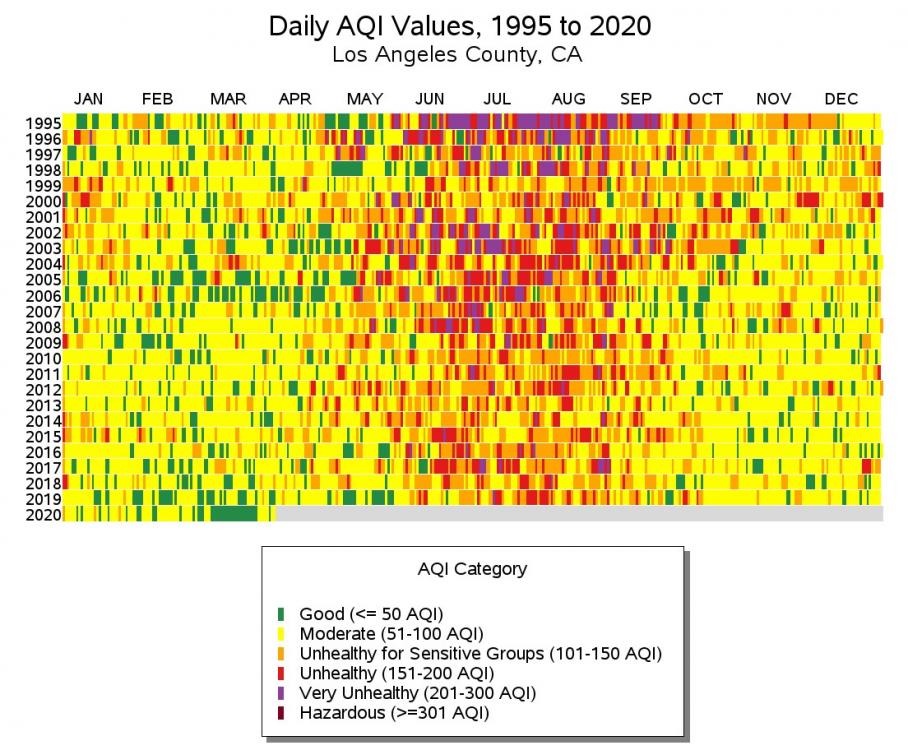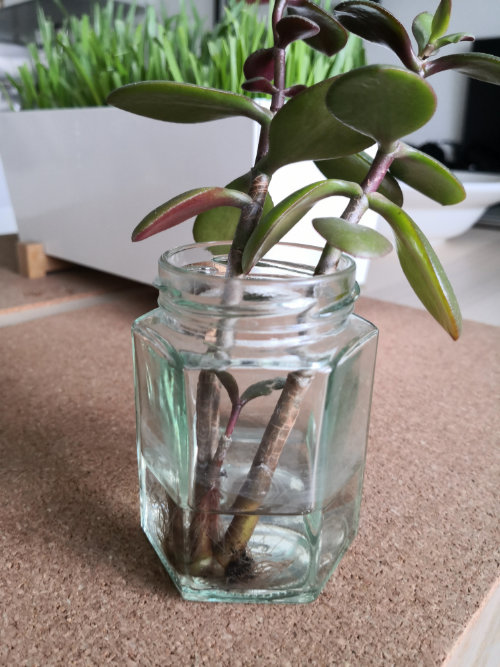-
Posts
2,912 -
Joined
-
Last visited
-
Days Won
60
Content Type
Profiles
Environment News
Forums
Blogs
Gallery
Events
Everything posted by Simon
-
While huge fires are ravaging the US west coast, Trump continues to ignore reality and spread his science and climate denialism. In a recent press conference, the US president and clown-in-chief said that "it'll start getting cooler. You just watch ... I don't think science knows, actually." Click here to watch the video.
BBC News also reports that:
QuoteBut Mr Trump has blamed poor forest management for the fires that have burned almost 2 million hectares (5 million acres) of land in California, Oregon and Washington state. During his visit to the US West Coast, Mr Trump - who has often denied climate change - repeated his argument on forest management as he met Californian officials involved in the battle against the wildfires.
[...] In 2018, the president criticised California's forest management, pointing to Finland, where he said they raked and cleared the forests to prevent fires.
The stupidity and ignorance on display here is so painful that it physically hurts. Humanity is doomed.
-
In a "podcast" that was aired on Sweden's biggest radio broadcaster earlier this summer, Greta Thunberg said that humanity has not yet failed and urged world leaders to do more. The young climate activist also said that "doing our best is no longer good enough" and that "we must now do the seemingly impossible." In the 75 minute long podcast, Greta Thunberg tells the listener about her trip across the Atlantic Ocean where she spoke in front of world leaders at the General Assembly of the United Nations last year, her visit to the state of Alberta in Canada where she at several occasions had to call the police for protection, and how humanity is quickly running out of time to save the climate. You can listen to the podcast in English here or on Spotify. More than a million people listened to the podcast when it was aired on Swedish radio (Swedish source) and an English version has also been aired on BBC. The Time has also published an essay, or transcript, of the podcast. Check it out: Six Months on a Planet in Crisis: Greta Thunberg's Travel Diary from the U.S. to Davos TIME.COM From Washington, D.C. to Davos, read Greta Thunberg's travel diary of six months fighting climate change around the world. "This essay is adapted from the transcript of a radio program produced for Swedish Radio and broadcast in June. This is the first time the text has been published in its entirety."
-
- greta thunberg
- climate change
-
(and 3 more)
Tagged with:
-
There have been a lot of talks about Europe being a climate leader, but the EU and European countries like Norway and Great Britain are sabotaging its own climate goals by subsidising the fossil sector by more than €137 billion per year, according to a new report by Investigate Europe. Europe will never be able to fulfil its climate commitments or emission reduction goals if it doesn’t stop these enormous subsidies to the fossil fuel sector. But despite this, there are still no plans to phase out these huge fossil subsidies.
-
- europe
- climate change
-
(and 5 more)
Tagged with:
-
Conservationists are desperately trying to save a glacier in northern Italy from melting away by covering it in giant white sheets. The Presena glacier is a popular skiing resort that attracts tourists from around the world, but the glacier has lost more than one third of its volume since 1993. Once the ski season is over, the glacier has been covered by giant white tarps that block the sun’s rays in an effort to slow the melting. The project has been ongoing since 2008 and now covers around 100,000 sq. metres of the glacier. Italian team covers glacier with giant white sheets to slow melting | Environment | The Guardian WWW.THEGUARDIAN.COM Every summer, the Presena glacier in northern Italy is protected from the sun with huge reflective sheets Imagine that, people are travelling by plane from around the world to go skiing on this glacier. And as soon as they leave, by plane, we are putting huge white tarps on the glacier to save it from climate change caused by this lifestyle. The world is so crazy.
-
- italy
- climate change
-
(and 2 more)
Tagged with:
-
Facebook considers climate denialism an "opinion" and refuse to fact-check climate denying advertisers!
Facebook has decided to view climate denialism as just another “opinion”. This means that advertisement on the popular social networking site that pushes climate denialism doesn’t need to be fact-checked by experts. Climatewire reports (content is unfortunately behind a registration/paywall) that climate denialist groups, like “the CO2 Coalition”, are now pouring money into Facebook ads which says that “burning more fossil fuels would help humanity”.
Facebook is just horrible, boycott them if you aren't already.
-
While browsing Youtube I found this rather interesting video that takes a closer look on how the gaming industry have portrayed global warming in the games we have played for the past 30 years. I found it interesting that the video showed how climate change have become a "controversial" political issue in recent years - even in games. I think the video did rather good job in showing how the gaming industry is now refraining from portraying the crisis properly, and instead coming up with easy, quick-fix solutions to climate and environmental issues that are designed to merely be annoying and far from the catastrophic and end-game events they actually are. Have you played any games that does a good job in portraying climate change?
-
- global warming
- climate change
-
(and 3 more)
Tagged with:
-
Did you know that climate change threatens both chocolate and coffee? Chocolate is on track to go extinct in 40 years due to climate change. The warmer temperatures and drier weather, from man-made climate change, will hit cacao plants so hard that they, according to experts, could disappear by as early as 2050. And climate change will have similar severe effects on the world’s coffee supply. Maybe this will get the attention of the general population?
-
- climate change
- global warming
-
(and 2 more)
Tagged with:
-
You usually hear the phrase that we're all responsible for climate change and that it's a global problem and all that. But is that really true? Are we all equally responsible for climate change? Of course not. World's richest 10% produce half of global carbon emissions, says Oxfam | Environment | The Guardian WWW.THEGUARDIAN.COM But poorest half of world’s people contribute to just 10% of emissions, says British charity as negotiators work on UN climate change deal in Paris A report, released by British charity Oxfam in 2015, clearly shows how unequal this responsibility really is. According to the report, the world's richest 10 percent produce half of the greenhouse gas emissions that's causing this climate crisis. Meanwhile, the poorest half only contribute a mere 10 percent of emissions. And let's be real here, not much has happened over the course of two years to change this unequal division. And this is not about individuals, either, it's about developing and developed nations, the South versus the North. And of course it's not all black and white. The rich, and developed countries, have a historic responsibility to make deeper cuts than poorer developing countries, and to take the lead in the fight against climate change. After all, they have the most to cut and can best afford to forgo "development". That's climate justice.
-
- rich people
- north
-
(and 4 more)
Tagged with:
-
A climate change tweet, by author and political analyst Anand Giridharadas, has as of writing received more than 120 000 retweets and 340 000 likes on the social media platform Twitter. In the tweet, Giridharadas writes that “nothing more needs to be said” and shows two screenshots of tweets from two different news stories. The headline on the first news story says that $300 billion is the amount of money needed to stop the rise in greenhouse gases and buy up to 20 years of time to fix global warming. The second news story explains that the world’s 500 wealthiest people gained $1.2 trillion in 2019, boosting their collective net worth to $5.9 trillion. The tweet and the story have gotten a life of its own on social media with many people seemingly equating these $300 billion to saving the climate. But that is obviously a misleading and way too simplistic view. $300 billion won’t be nearly enough to save the climate. It would – if it’s not too late already – only give us a few more years of breathing room to implement radical green policies on a global scale that actually could save the climate. But it does show that we can afford to save our climate – if we wanted to. Simply by just implementing a climate tax that takes one-quarter of the capital gains in a single year from these 500 wealthy individuals, the earth could get a little more time – time we desperately need – to save the modern human civilization from destruction. The story shows that making the rich pay their fair share is essential in fighting the climate crisis, be it individuals or nation-states. For example, these $300 billion is half of the US military budget for only one year. Or the yearly military budget of Germany, or France. But unless we don’t stop increasing our emissions of CO2 and other greenhouse gases now, these $300 billion for reforestation will be useless either way. There is no easy way to combat climate change. If we want any chance of limiting warming below the dangerous 2 degrees threshold, we must combine solutions like this $300 billion reforestation program with aggressive mitigation of our greenhouse gas emissions.
-
- climate change
- inequality
- (and 5 more)
-
On Augusti 22nd, we humans had consumed and used up more natural resources that the Earth can renew in 12 months. This is called "Overshoot Day" and usually it happens earlier and earlier every year, according to calculations by the American NGO Global Footprint Network. According to these calculations, Earth Overshoot Day happened on December 29th in 1970, November 4th in 1980, October 11th in 1990, September 23rd in 2000 and August 7th in 2010, and in 2019 Earth Overshoot Day happened on July 29th. But in 2020, Earth Overshoot Day didn't take place until Augusti 22nd. Analysts believe that the slight delay this year is because of the effects the coronavirus (Covid-19) has had on slowing down human activity and the global economy.
- 1 reply
-
- earth overshoot day
- overshoot day
- (and 5 more)
-

We are seeing a huge drop in air pollution thanks to the coronavirus
Simon replied to Simon's topic in Green Talk
You don't really understand or appreciate the drastic change by just looking at these graphics and numbers. Instead, check out these amazing before and after photos of the change in air quality in Delhi, India. 'It's positively alpine!': Disbelief in big cities as air pollution falls | Environment | The Guardian WWW.THEGUARDIAN.COM Delhi is one of many capitals enjoying improved air quality since restrictions were introduced due to the coronavirus "The blissful sight of blue skies and the joy of breathing clean air provides just the contrast to illustrate what we are doing to ourselves the rest of the time." Indeed!- 8 replies
-
- covid-19
- coronavirus
-
(and 1 more)
Tagged with:
-

We are seeing a huge drop in air pollution thanks to the coronavirus
Simon replied to Simon's topic in Green Talk
And here is an astounding air quality data chart from EPA which shows that Los Angeles had the cleanest air ever recorded in March 2020. This reduction is mostly from reduced driving, just like we can see from data in Europe and elsewhere. Just imagine, if we manage to electrify transportation this could be the new normal and millions of people living in Los Angeles (and other major cities) would live healthier and longer lives.- 8 replies
-
- covid-19
- coronavirus
-
(and 1 more)
Tagged with:
-

We are seeing a huge drop in air pollution thanks to the coronavirus
Simon replied to Simon's topic in Green Talk
Here is data from the European Environment Agency (EEA) which also confirms that we are seeing a huge drop in air pollution, particularly of nitrogen dioxide (NO2). The EEA says the reduction is largely due to "reduced traffic and other activities, especially in major cities under lockdown measures." In Milan, average concentrations of NO2 for the past four weeks have been at least 24 % lower than four weeks earlier this year. The average concentration during the week of 16-22 March was 21 % lower than for the same week in 2019. In Bergamo, there has been a constant decline in NO2 pollution over the past four weeks. The average concentration during the week of 16-22 March was 47 % lower than for the same week in 2019. In Rome, average NO2 concentrations for the past four weeks were 26-35 % lower than for the same weeks in 2019. In Barcelona, average NO2 levels went down by 40 % from one week to the next. Compared with the same week in 2019, the reduction was 55 %. In Madrid, average NO2 levels went down by 56 % from one week to the next. Compared with the same week in 2019, the reduction was 41 %. In Lisbon, average NO2 levels went down by 40 % from one week to the next. Compared with the same week in 2019, the reduction was 51 %. Also note this: Hans Bruyninckx, EEA Executive Director, notes that "addressing long-term air quality problems requires ambitious policies and forward-looking investments." So, cleaner air equals better public health. But how can we continue this positive trend without the economy going into full depression-mode? Now that's an important post-coronavirus topic.- 8 replies
-
- covid-19
- coronavirus
-
(and 1 more)
Tagged with:
-
As the coronavirus (Covid-19) pandemic is forcing cities and whole countries to go into lockdown we can see how nature and wildlife are coming back to cities under strict quarantine. Now researchers can also see how the coronavirus is leading to huge drops in air pollution around the world. Coronavirus pandemic leading to huge drop in air pollution | Environment | The Guardian WWW.THEGUARDIAN.COM ‘Largest scale experiment ever’ shows what is possible as satellite images reveal marked fall in global nitrogen dioxide levels Satellite imagery from the European Space Agency (ESA) shows how air pollution, like nitrogen dioxide, are drastically being slashed in countries like China, South Korea, Italy, and the UK. The drop in air pollution is mainly coming from industrial activity that is shutting down, reduced road traffic as people are staying home also plays a big role in slashing air pollution levels in and around cities Around 7 million people die each year because of air pollution, so this drastic reduction will make a difference, it will especially help people that suffer from asthma. It could also boost agriculture as air pollution stunts plant growth. The huge drop in air pollution also shows what could be possible if we limited industrial pollution and moved towards a green economy. Paul Monks, professor of air pollution at the University of Leicester, told the Guardian that he predicted there will be important lessons to learn. "We are now, inadvertently, conducting the largest-scale experiment ever seen," he said. "Are we looking at what we might see in the future if we can move to a low-carbon economy? Not to denigrate the loss of life, but this might give us some hope from something terrible. To see what can be achieved."
- 8 replies
-
- covid-19
- coronavirus
-
(and 1 more)
Tagged with:
-
Isn’t it interesting to see how capitalism faced with the global coronavirus pandemic is currently asking socialism to save it from collapsing? And isn't it fascinating to see that the very same people who until just a few weeks ago said that there wasn’t enough money to invest in a green transition now have magically found trillions to prep up a crashing economy? And yes, sure, we must "save our economy" to avoid further despair and suffering – especially among the working class and the poorest and vulnerable people of our societies. But how about that after the coronavirus has been defeated, we immediately treat the climate crisis as the existential crisis it actually is, and we save the very prospects for future human existence on this planet?
- 3 replies
-
- politics
- coronavirus
- (and 7 more)
-
Let's talk about sperm, and more precisely Western male's sperm, because it seems male fertility is facing a sharp decline in Western nations - and environmental pollution could be responsible. There may be something weird going on with Western men's sperm WWW.POPSCI.COM A meta-analysis of existing literature suggests sperm counts in Western countries have declined by as much as 50 percent. According to a study published this past summer, there may be something weird going on with men's sperm. The study found a sharp decline in sperm count between 1973 to 2011 in North America, Europe, Australia, and New Zealand where sperm counts seems to have dropped by more than 50 percent. The study cannot show why sperm counts are declining. But the author of the study believes that various environmental factors, such as harmful chemicals, could be responsible for the steep decline in sperm counts, and worse yet, the drop doesn't seem to show any signs of slowing down. Because data from non-Western nations are either missing, not reliable or inadequate, the study couldn't show an equivalent decline in sperm counts from males in South America, Asia, and Sub-Saharan Africa. One could be tempted to think that this study shows how Western culture, lifestyle and industrialization exposes men to more harmful chemicals than typical lifestyles in the non-Western world, but again, this study is not capable of drawing such conclusions. What do you think is causing the steep decline in sperm counts? And is it just happening in the West or is it a global problem?
- 2 replies
-
- pollution
- environment
-
(and 2 more)
Tagged with:
-
Let's share examples of amazing off-grid homes! Here is a rather spacious off-grid cabin that is built on a beautiful cliff with a spectacular view of a forest and its treetops. The cabin has two lofts, one is a living room, and one is the bedroom. On the main floor is a kitchen, a bathroom with a sink and a bath (but no toilet because the owner prefers to have the toilet outside), and a spacious living area with the wood stove and dining table. If you know of any other amazing examples of off-grid homes, please do share them here.
-
- off-grid
- off-grid living
-
(and 2 more)
Tagged with:
-
Let's share examples of smart and pleasant compact homes that showcases the possibilities of living small! The Cairo Flat is a 23sqm/247sqft micro apartment located within lush green communal gardens in Melbourne, Australia. The home utilizes compact robes and clever storage solutions, an integrated fold-out bed and a full-height curtain, which allows you to quickly convert the single-room space from a study to a bedroom to a dining room or party space.
-
- compact living
- compact home
- (and 4 more)
-
If you have a larger vegetable garden and slugs is a big problem for you, then you might want to consider using ducks as an environmentally-friendly and natural pest control.
-
Plant propagation is a simple and easy way to grow new plants from your already existing plants. Here are two good videos that you can watch to learn how to grow new plants from seeds, cuttings, and other plant parts. The video below shows how you can propagate five different and common house plants: And here is a similar video on this topic that will also give you some ideas on how you can display them in your home: Have you tried this before? If so, do you have any tips on how to propagate various plants? I mean, this is seriously super easy, even I can do it. Check out this plant that I'm saving after my cat accidentally broke it off.
-
- plants
- plant propagation
-
(and 1 more)
Tagged with:
-
This chronicle where a man explains how the coronavirus pandemic has caused him to rediscover biking is good, and it explains the very same situation I am now facing as well. Just like Toby, I've been going to work using public transportation for years now. But since this horrible coronavirus pandemic came to my own country, I've stopped using public transportation and started using my bike again. Luckily, it's spring and the weather is mostly okay. The downside is that my fitness is not what it used to be after years sitting still on a bus. But I like it, honestly, it is refreshing, and my body feels more alert. It also means I don't have to stress and rush to catch my bus, I simply can go whenever I want. What about you? Has the coronavirus crisis forced you to use a bike or other transportation alternatives? Or maybe it's the opposite for you, and you are back to using your old car again?
-
How much does it really cost to charge an electric vehicle for a full year? Well, I don't know, but I found this neat website that compares the cost of charging your electric vehicle for a full year in 50 different countries. Check it out here: https://www.uswitch.com/gas-electricity/world-powers/#how-much-does-it-cost-to-charge-an-electric-vehicle Do you have an electric vehicle and does the calculations on that website seem right or are they completely wrong?
-
Check this out! This is Zalmon which is 100% vegan salmon. I haven't tried it myself, but I've heard that it tastes just like real salmon. This vegan salmon is made by Oh Vegan and they also offer vegan alternatives to tuna and shrimp. It's amazing to see how far vegan alternatives have comes since just a few years ago. I just wish stuff like this was more widely available. Doesn't that look delicious or what!?
-
Here is a good article that explains why it is such a good time now to become a vegan or a flexitarian, and especially now during the coronavirus pandemic. https://www.inquirer.com/resizer/tckwFpee6-1qJxvq-ABXrorNUr0=/1200x0/center/middle/www.inquirer.com/resizer/rP-mbA6gkUkXbzZFPwSm0QQluVw=/1200x0/center/middle/cloudfront-us-east-1.images.arcpublishing.com/pmn/GBMFE334ORBVPI2X4F7CNVITKE.jpg https://media.inquirer.com/designimages/apple-touch-icon.png It’s a good time to become a vegan WWW.INQUIRER.COM Many of us are spending more time in the kitchen, making it a good opportunity to experiment with plant-based recipes. The author explains how a vegan or a more green and flexitarian approach to food can help you save money and requires fewer shopping trips, which are all good during these times of social distancing and uncertain economic prospects. And now when most of us are staying home, we finally have time to learn and try new recipes. We also have no social pressure to conform to the expectations of a meat-diet or having to try and explain why you are trying a vegan or more plant-based diet. Have you tried going vegan during the lockdown?
- 1 reply
-
- vegan
- vegetarian
-
(and 1 more)
Tagged with:






